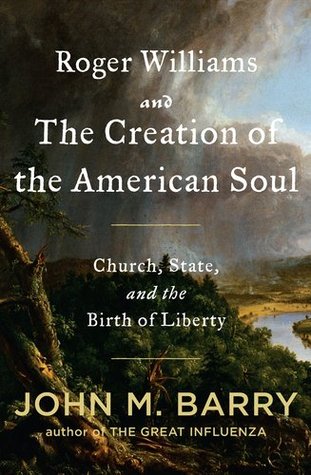
Roger Williams and The Creation of the American Soul, John M. Barry. New York, NY: Viking, 2012. [Publisher link is to paperback edition]
Summary: A study of the life of Roger Williams focusing on the intellectual influences upon Williams, his journey to Massachusetts, banishment and founding of Rhode Island, and his signal ideas of freedom of conscience and government by consent of the governed.
Questions of church and state, a “Christian” vision for America, and the battle to be free to believe as one wills and practice those beliefs are as contemporary as the most recent national elections, but trace back to our very beginnings in New England. Reading this account of the life of Roger Williams gives me a deeper appreciation of a figure who laid the groundwork of the protections of both religious liberty and from religious tyranny that we enjoy, and the recognition of the human right of freedom of conscience.
Many accounts of Williams’ life begin with his banishment from Massachusetts and his flight into the wilderness, taking shelter with the Narragansetts he had befriended, and then establishing the town that would become Providence, leading eventually to the chartering of Rhode Island and Providence Plantations. This account begins by tracing his youthful apprenticeship with Edward Coke, one of the greatest legal minds of the age, and a steadfast resister of royal tyranny, whose resistance resulted in his going to the Tower of London. He also closely observed Francis Bacon, the great scientist, but also chancellor to King James, and from him developed a commitment to reaching conclusions by evidence that led later to his own independence in forming theological views, leading to his break with the founders in Massachusetts.
Like many Puritans, Williams, who for a time was sheltered as a “chaplain” to a distinguished family, faced the scrutiny of Bishop Laud, and like many, fled to America. The Massachusetts colony was established with a vision of being a “city on the hill” where Christian faith shaped every aspect of the colony’s life and where religious and governmental functions were closely enough aligned to be at one. Williams, exposed to this theocratic government concluded that government could enforce only those parts of the law (the second table) having to do with human beings relationships with each other. To try to enforce the first would be to intrude upon the individual conscience. Williams also reached conclusions that questioned the basis upon which colonists obtained the native people’s land. Eventually, the authorities, including close friends from England, banished him and even attempted at one point to seize him by force and take him to England, where he likely would have been executed. Only flight in mid-winter saved him, and led to the beginnings of Rhode Island.
From the beginning, Williams vision was to set up a place, not where anarchy ruled, but where conscience was free and people could believe and worship as they pleased (or not). At various points we see Williams fending off Massachusetts, Plymouth, and Connecticut from carving up Rhode Island, even as he also intercedes with Native tribes to avert war with the colonists.
Eventually this leads to a return of Williams to the England he had fled to obtain a charter that would formally recognize Rhode Island (and Providence Plantations-its full name) as a colony in its own right. Furthermore, Williams is proposing the radical idea of a colony with no state church. The account of how he does this, as well as a significant work he published during a second visit, The Bloudy Tenent is fascinating, and along with the early influences in his life, often overlooked. In The Bloudy Tenent he argues both for freedom of conscience and for the idea that the state’s power to govern should derive from the consent of the governed. These ideas, via John Locke, shaped the thinking of the founders.
Williams did not remain unscarred in all the conflicts he faced. After his banishment, he took up briefly with the Baptists, but then never again joined or formed a church. He continued to believe, but his significant contributions would be in the learning of Native languages and his relations with Native peoples, his leadership in Rhode Island and politically savvy relations in England, and his political thought that laid the foundations for freedom of conscience, religious liberty and freedom from religious tyranny, which has also frustrated efforts to enforce a Christian conscience upon the nation that continues to this day.
Barry offers a narrative that helps us see the combination of intellectual influences and life events that shaped the thought and actions of Williams. It strikes me that the peculiar genius and grace of Williams was to create a space for the liberties and form of government he believed in without attacking those who attacked him. He worked skillfully and shrewdly and yet as a man of peace in the midst of warring factions in the colonies and civil conflict with bloody executions in England. It seems we could use more like him.
Editor’s Note: Thank-you to Bob Trube for sharing his reviews with Emerging Scholars! Bob first posted the above review on Bob on Books. I thought this was particularly apt as we continue to reflect upon and discuss the politics of the past year. Let us individually and as the people of God by faith place our hope/confidence in Christ the King. May the Lord grant us grace as we seek after the Kingdom of God this Advent, Christmas . . . coming year. To God be the glory! ~ Thomas B. Grosh IV, Associate Director, Emerging Scholars Network
Bob Trube is a former Associate Director of Faculty Ministry and Director of the Emerging Scholars Network. He blogs on books regularly at bobonbooks.com. He resides in Columbus, Ohio, with Marilyn and enjoys reading, gardening, choral singing, and plein air painting.

great review!!!
Thanks!